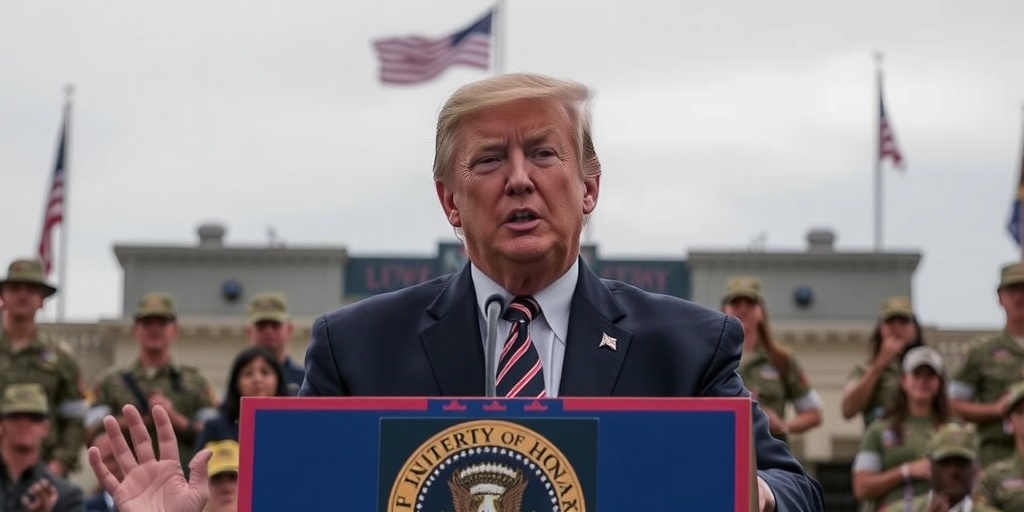Now Reading: Washington Tradition Continues Uncomfortably Without Trump
-
01
Washington Tradition Continues Uncomfortably Without Trump
Washington Tradition Continues Uncomfortably Without Trump
Trump’s Distant Dance: The Gridiron Dinner and Washington’s Fractured Atmosphere
In Washington, D.C., the glitzy Saturday night Gridiron dinner, a long-standing tradition where journalists, politicians, and influencers gather for a night of toasts and light-hearted ribbing, faced an unexpected absence at its 2025 gathering. This year’s event, famous for its jovial atmosphere and self-deprecating humor, felt particularly strained, with the president opting to keep his distance from what many hoped would be a unifying affair.
The annual white-tie dinner, hosted by the Gridiron Club, a journalistic organization established 138 years ago, typically sees high-ranking officials mingling with media talent. Judy Woodruff, PBS News anchor and club president, expressed disappointment as she confirmed that invitations were declined by not only the president but the vice president, national security adviser, and even the interior secretary. Only one member of Trump’s cabinet, Housing and Urban Development Secretary Scott Turner, made an appearance.
The president’s absence highlights an ongoing rift between the Trump administration and the entrenched political establishment in Washington. Unlike in his previous presidency, where he made a token effort to engage with the event by attending in 2018 and allowing his daughter Ivanka to represent him the following year, his current approach reveals a definitive disinterest in establishing rapport with the traditional power structure.
As news broke of the Trump administration’s withdrawal, other Republicans reportedly chose to follow suit. Figures like Chris LaCivita, a campaign manager for Trump’s 2024 run, and former chief of staff Reince Priebus scrapped their plans to attend. Those who did show up expressed regret, with Army Secretary Daniel Driscoll reportedly leaving the hall mid-joke about Vice President JD Vance. One White House official derisively labeled the Gridiron and its members as the elite establishment that Trump’s base sought to dismantle.
The atmosphere permeating the dinner was one of division rather than solidarity. The night featured satirical skits that poked fun at Democrats, Elon Musk’s political pivot, and the Ivy League background of the vice president and his spouse. The gathering became a spectacle of its own, with high-profile attendees including billionaires and journalists partaking in a meal that served a notably pungent Chilean sea bass.
In the midst of this somber parody, several attendees voiced their frustration at the current media landscape. Jokes about Jeff Bezos’s ownership of The Washington Post and his appointed publisher left many guests uncomfortable, particularly considering the prominent editorial changes and alleged censorship stemming from this ownership.
One notable moment came when the audience applauded former Washington Post columnist Ruth Marcus, who had recently resigned from the publication amidst discontent over the pressures exerted by Bezos and Lewis. Strikingly, there was typically a presidential toast, whether or not the president was in attendance, but this year, there was none. Woodruff acknowledged the absence of Trump and Vance, but discussion about their presence quickly raised questions about whether it was truly desired.
Reflecting on this phenomenon, Jeffrey Goldberg, editor of The Atlantic, elaborated on the complex dynamics of Washington, suggesting that attending such gatherings, even amidst criticism, serves a greater purpose: maintaining democratic unity. He noted the inherent contradictions in mingling with those one publicly critiques, pointing out that historically, Washington officials have weathered scrutiny from the media throughout different eras.
Trump’s decision to skip the dinner aligns with his continual engagement with his base—a demographic that often views the political class in Washington contemptuously. By eschewing traditional press events, he maintains a position that not only positions the media as adversarial but reinforces his portrayal as a champion against the perceived elitism of Washington.
A video presentation during the dinner reminded attendees of Trump’s lighter, more self-deprecating turn at the Gridiron dinner in 2018—a contrast to his current approach. The former president now finds himself leading a parallel establishment rife with its own power dynamics. Cabinet members who declined invitations are often spotted engaging at exclusive venues like The Ned, an upscale members-only club, or Butterworth’s, a favorite among young Republican insiders on Capitol Hill.
As the club’s formal wear shop proprietor, Ismet Dil, noted just before the dinner, business was unusually slow, marking a stark change in attendance tone compared to past years. “This year is a bit sad,” he remarked, indicating not just a shift in participation at events like the Gridiron, but a reflection of the ongoing schism in American politics that seems increasingly difficult to bridge.
Ultimately, the Gridiron dinner served not only as a platform for laughs and camaraderie but as a stark reminder of the widening chasm between the political class and the administration, raising questions about the nature of engagement in a time defined by division and discontent.
Stay Informed With the Latest & Most Important News
Previous Post
Next Post
-
 01New technology breakthrough has everyone talking right now
01New technology breakthrough has everyone talking right now -
 02Unbelievable life hack everyone needs to try today
02Unbelievable life hack everyone needs to try today -
 03Fascinating discovery found buried deep beneath the ocean
03Fascinating discovery found buried deep beneath the ocean -
 04Man invents genius device that solves everyday problems
04Man invents genius device that solves everyday problems -
 05Shocking discovery that changes what we know forever
05Shocking discovery that changes what we know forever -
 06Internet goes wild over celebrity’s unexpected fashion choice
06Internet goes wild over celebrity’s unexpected fashion choice -
 07Rare animal sighting stuns scientists and wildlife lovers
07Rare animal sighting stuns scientists and wildlife lovers



















